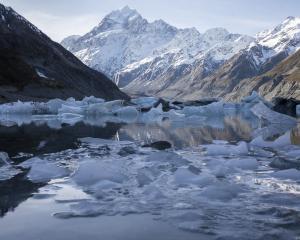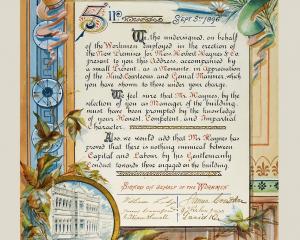
Tarek Bazley is well-acquainted with hot spots.
A senior producer for burgeoning televisioe bath-time and keep the air-conditioning going lest the water becomes too hot.
The autumnal skies above Otago thus provided a welcome contrast recently as Mr Bazley visited family in Alexandra and headed to Dunedin for a couple of days to take part in the latest round of data collection for the Dunedin Multidisciplinary Health and Development Study, the University of Otago's long-running survey of about 1000 people born in Dunedin in 1972-1973.
"I feel like it's a good thing to be involved in," Mr Bazley says, relaxing over a red wine at his parents' Central Otago home.
"They have got such a valuable resource in terms of the survey group that they now have the funds to fly people in from all around the world."
The study is into "phase 38" - in other words those aged 38 - a time of life which can involve much juggling of work and family commitments. Mr Bazley knows this full well: he might be based at the head offices of Al Jazeera's English division, but his job often requires him to pack his bags quickly.
Having been recruited by Al Jazeera English several months before the network went to air in November 2006, the former University of Otago student was initially based in London before being appointed a senior producer in Doha. In that time, he has travelled to dozens of countries in Europe, Asia, Africa and the Middle East, covering everything from elections and wars to corruption and climate change issues.
As a television news producer, his role involves a range of duties, including reporting on location, sourcing material, organising transport, finding local fixers ("someone who knows the language and lie of the land and the personalities you need to contact, people who are well connected, who will get you in the door ..."), briefing presenters and compiling and editing both pre-shot and breaking news stories.
"You are liaising constantly with head office about when they want you to get to the satellite truck to do a live cross," Mr Bazley explains.
"You might then file a report that you've been working on in between doing live pieces and bits and pieces. You do all of the organisation and if there is a correspondent on board, you often get none of the glory."
Al Jazeera English went to air a decade after the Arabic-language Al Jazeera Satellite Channel was launched on November 1, 1996. The new channel, which has broadcast centres in Doha (next to the original Al Jazeera headquarters), London, Kuala Lumpur and Washington, operates 24 hours a day, seven days a week, as does the Arabic network.
With an estimated reach of about 250 million people in 120 countries, Al Jazeera English, like its Arabic sister station, has great influence. With that comes responsibility, says Mr Bazley.
"It comes back to a famous quote along the lines of, 'if you are a journalist and are upsetting everyone, then you are doing your job'. You should be upsetting people in authority, but I don't mean you should report in a salacious, tabloid way.
"We have been banned and stopped from broadcasting in numerous countries, from Saudi Arabia to the United States. We have pretty much upset every government at some time."
Criticism of Al Jazeera includes its airing of what are termed the "Bin Laden Tapes", a series of recordings featuring al Qaeda leader Osama bin Laden, who was killed by United States special forces earlier this week.
An Al Jazeera Listening Post article in early 2010 provides some insight into the issue: "In our lead story this week we focus on the broadcast of Osama bin Laden's latest audio tapes ... Like so many times before, the tapes were delivered to Al Jazeera and, just as before, it set off a debate, both inside and outside the network, on whether it should be broadcast.
"Ever since the 9/11 attacks in 2001, Al Jazeera has been the network al Qaeda has often chosen to deliver its messages to. For al Qaeda, the channel's reach in the Arab and Muslim world, as well as its global audience, is key ... Al Jazeera has been criticised for broadcasting the tapes, in a way that other news organisations have not when they have broadcast or published messages from similar groups."
In other words, critics are simply shooting the messenger, Mr Bazley says, adding the network has acted as many others would: "It viewed hours of original footage, deemed what was newsworthy and edited it accordingly".
Though denounced, somewhat unsurprisingly, by the United States' Bush Administration (chief among the critics was former Secretary of Defence Donald Rumsfeld), material aired on Al Jazeera does attract the attention of Washington.
In March this year, US Secretary of State Hillary Rodham Clinton testified before the Senate Foreign Relations Committee that Al Jazeera provided more informative news coverage than most American media.
The network continues to annoy those in power. The Egyptian Government ordered Al Jazeera to close its Cairo offices on January 30; the following day, Egyptian security forces detained six Al Jazeera journalists for several hours and seized their camera equipment.
Ultimately, Al Jazeera - like news organisations around the world - continued to report on a revolution that began with mass protests on January 25 and ended on February 11 with the resignation of Egyptian President Hosni Mubarak.
Mr Bazley, who had reported on an Egyptian workers' protest in Cairo in May 2010 (one of a series of precursors to this year's uprising) and recently compiled a summary of the 18-day uprising, says he feels both a personal and professional pride at covering such historic events.
"Being a journalist is a privileged position ... your job is to try to report back truthfully what is happening and why it is happening. In the two or three minutes you have on air, you are trying to provide the best explanation you can.
"I do feel a sense of responsibility. Get it wrong and you are doing a disservice to your viewers. You learn quickly when someone is giving you the runaround or not answering the question directly. You have a responsibility to hold people to account; you're not there to accept a pat answer or to massage someone's ego."
MR Bazley completed his studies at the University of Otago in 1997, leaving Dunedin with a degree in law, another in literature and a swag of songs courtesy of his time playing fiddle and guitar in The Pog 'n Scroggin Bush Band and Maud Gonne.
In 1998 he headed to Paris, where he worked as a trainee in the English-language section of Radio France International and developed a taste for journalism.
"I'd actually been quite cynical of the media during my days at university. I remember my mother saying I should go into journalism and me giving her a certain reaction," Mr Bazley recalls.
"I asked my Radio France boss for a permanent job and he suggested I get a journalism qualification."
In 2000, following a stint as a media and internet researcher for a European law firm, Mr Bazley returned to New Zealand to do a postgraduate diploma in journalism at Massey University.
It proved to be a good career choice: after an internship at Cambodia's Phnom Penh Post, he was employed by Radio New Zealand, working as a reporter, producer and programme editor for Morning Report and other segments.
Although Mr Bazley is quick to point out awards can be something of a "lottery", he nevertheless collected five Qantas Media Awards in as many years: student broadcast prize (2001), best junior radio news reporter (2002), best junior reporter-breaking story (2003), best radio arts current affairs story (2004) and best radio arts news reporter (2005).
In 2004, he headed to London, where he worked as a freelance broadcast journalist for BBC World Service Radio and BBC World Television, including extensive periods producing material for its flagship current affairs show Hardtalk, before he was contacted by Al Jazeera and offered a job.
Winner of an Asia 2000 Travel Media Award, which facilitated a series of rather intrepid journeys (including to Sri Lanka, Pakistan and Iran), Mr Bazley is no stranger to long-distance assignments. With Al Jazeera, he has roamed from Baghdad bombings to southern India biogas projects, a dream job for someone "quite curious" about the world.
"In a lot of countries, journalism is a dangerous occupation," he says before recounting a notable meeting with a Bulgarian underworld boss.
"Our fixer said the guy was too tough to interview. But we got to sit down with him to do an interview, at the end of which he pulled out a loaded pistol, put it on the table and said, 'you won't misrepresent me, will you?'.
"And I asked him some tough questions: 'are you a heroin dealer? Have you killed people?' Clearly, he was a big fan of The Godfather ... he had a huge ego. But, again, you had to push this guy," Mr Bazley says.
"We've had instances where we've decided not to run a story before we've left the country - for our own safety. But also we have checked with our fixers as to whether they were comfortable with it. You rely a lot on those local people and, to be honest, they have to live with the consequences of our actions.
"There is a danger in international journalism that you just parachute in, suck the story out of the people around you and get out again. But it doesn't breed long-term relationships."












